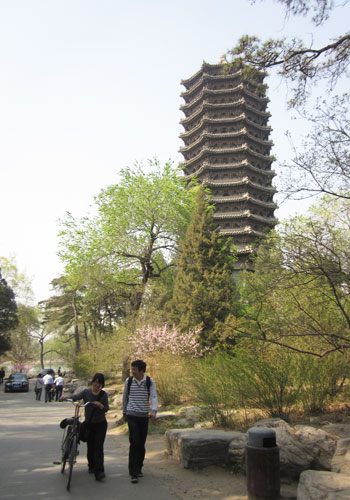Peking University honors the past, creates future
|
The towering pagoda on the north side of campus adds to the traditional Chinese atmosphere. [Photo:CRIENGLISH.com] |
|
The traditional buildings surrounding the lake offer excellent material for photographers. [Photo:CRIENGLISH.com] |
Beijing's famous Peking University, known locally as "Beijing Daxue," or just "Beida," sits directly west of its friendly rival, Tsinghua University. While the two universities duke it out every year for the rank of China's top university, the neighboring campuses are also renowned for their tranquil beauty.
Peking University today ranks as one of the best universities in the world, but the university was destined for excellence from the start. Founded in 1898 as the Imperial Capital University, the school replaced the Guozijian, or Imperial College, which was the nation's highest institute of learning during the Yuan, Ming, and Qing dynasties.
The new Imperial Capital University was located north of the Forbidden City. After the Xinhai Revolution of 1912, the university was renamed "National Peking University."
Three years after the founding of the People's Republic of China in 1949, the university's title was shortened to "Peking University" to reflect that all universities were "national." Peking University also merged with Yenching University at that time and moved to Yenching's former campus in the Qing dynasty gardens in Haidian District, where the university remains today.
While many of the university's buildings incorporate traditional Chinese characteristics, the school has long been a hotbed of progressive thought. In 1920, Peking University became the second Chinese university to accept female students, after Nanjing University. The students and faculty were instrumental in the formation of China's New Culture Movement and May Fourth Movement. Several of China's most prominent thinkers have taught at the school, including Hu Shi, Chen Duxiu, and Lu Xun, which demonstrates the institution's commitment to intellectual freedom.
One of the school's biggest claims to fame is that Mao Zedong worked there as an assistant librarian in his youth. His tenure at the university is credited with influencing the formation of his political ideology.
Unlike Tsinghua's original academic buildings, which feature a classic Western style common to many American and British universities, Peking University's older academic buildings pay homage to traditional Chinese architecture. These older buildings mainly sit on the northern end of campus.
The scenic "No Name Lake" is also located on the northern side of campus. Surrounded by buildings with traditional Chinese characteristics and even a towering pagoda, the lake is an excellent spot for visiting photographers.
A further walk west takes visitors to the historic West Gate, which is only open to pedestrians.
Heading south, the buildings take on a modern international appearance. One notable exception is the library, which is a massive structure with a Chinese-style curved roof. Near the library is the famous Guanghua School of Management and the stately Centennial Hall, which salutes the centennial anniversary of the school (1998) and serves as a center of activity on campus.
The campus also hosts several convenience stores, snack shops and fruit stands, along with a Subway chain restaurant and a coffee shop.
While creating the leaders of tomorrow and promoting intellectual progress, Peking University also pays homage to Chinese history with the traditional architecture of many of its buildings. A visit to the school's beautiful, well-maintained campus is a reminder of the importance of academic achievement in China, past, present, and future.
 0
0 








